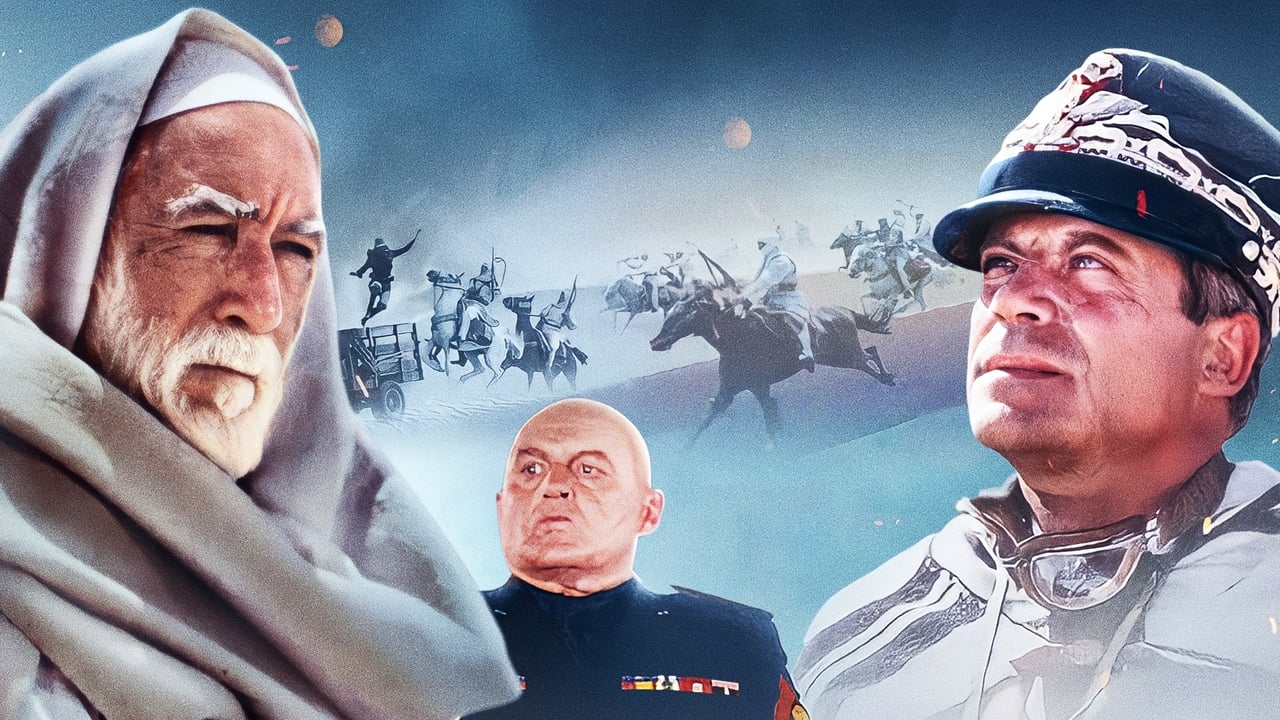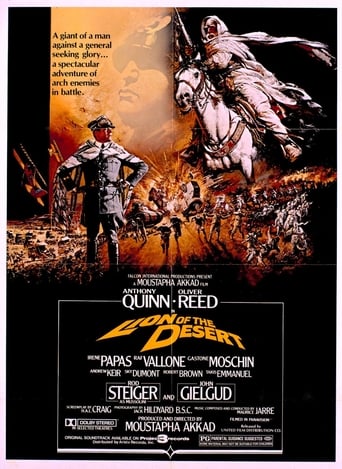

Really Surprised!
... View MoreExcellent, smart action film.
... View MoreExcellent, a Must See
... View MoreIt was OK. I don't see why everyone loves it so much. It wasn't very smart or deep or well-directed.
... View MoreA brilliant, sweeping historical masterpiece based on the true story of Omar Mukhtar, a teacher, who earned the nickname "the Lion of the Desert". Intelligent script, Magnificent acting, directing, and cinematography make this film one of the best anti-imperialist war films; depicting the great bravery and intelligence of one man and of one country's resistance against imperialist designs.The story depicts post-World War 1, but pre-WW2 era. Mussolini decides to use Libya as an "easy stepping stone" to carving up the Middle East. Libya turns out to not be such an easy stepping stone. The Italians may have had machine guns, planes and tanks; while the Libyan peasants had nothing, but old rusted rifles. However the Libyans had something the Italians didn't, conviction: They were willing to die to save their land and keep their independence. When Italian General Graziani asks "and you cared nothing for the ruination of your country?" Omar Mukhtar replies: "You are the ruination of my country. What would you do if someone occupied your land? Though brutal, there were conscientious objectors in the Italian army and one of the fascinating features of this film is their depiction from the soldier unwilling to serve to the Officer who defends him. The director captures the horrific methods the Italians used from concentration camps, setting fields and homes on fire to raping innocent women. However, what is shown is only a small fraction of the ruthless brutality used by Gen. Graziani against the civilian population. He was responsible for the slaughter of over 120,000 civilians in these concentration camps. To this day, this film is still banned in Italy. In fact, Graziani served only 2 years for his crimes after the fall of Fascism, and even became honorary president of the (legal) neo-fascist party.
... View MoreIt was one poorly disguised fact that Libyan oil money made Lion Of The Desert under the supervision of President Muamar Khaddafy of Libya. I guess Khadafy was trying to inherit the leadership mantle of Muktar Oman who led resistance to the Italian occupation of what became Libya after World War II. Knowing that the guy whose idea of war was blowing up airliners with civilian passengers kind of sours the message that Lion Of The Desert is trying to bring.Libya was grabbed off by Italy in the Balkan Wars which was kind of a dress rehearsal for several countries going into World War I. Previously the Bedouin territory was part of the decaying Ottoman Empire and Muktar Oman as played by Anthony Quinn is leading the resistance, still going on in the late Twenties. But Italy has undergone the Fascist revolution and Benito Mussolini as played by Rod Steiger is now in charge. He's sending in one of his best generals Rudolfo Graziani played here by Oliver Reed. Graziani is just the kind of ruthless man that's needed to subdue the Bedouins if anyone can.Reed and Quinn are an evenly matched pair of foes despite Italy having all the advantages of 20th Century armaments. Quinn however has the hearts and minds of the people. The film was directed by Moustapha Akkad and it is miles better than his previous effort The Messenger about the founding of Islam. Still knowing who is financing the message does kind of sour the film. Perhaps one day it will be judged on its own merits.
... View MoreThis is a British- Italian- Lybian co-production(financed by Lybian dictator Muammar Qaddafi), it starts explaining that Italy tries to retrieve the Roman Empire glory. In 1911, conquers Libya , including Tripoli, Tobruk and Benghazi. 1922, Benito Mussolini rules over Italy. 1929, Mussolini(Rod Steiger) assigns Rodolfo Graziani(Oliver Reed) the mission to stifle the Bedouin guerrilla and pulls off a new invasion . Graziani, under direct orders dictator Mussolini, along with Amadeo, Duke of Aosta(Sky Dumont) goes to Libya soil fend off the rebellious. Omar Mukhtar(Anthony Quinn) organizes Lybian forces to keep the Italian army formed by tanks and armored vehicles facing off Bedouin troops on horseback. Mukhtar , the Lion of the desert, and his rebels patriots hold off the encroachment for twenty years, from 1911- 1931. Omar Mukhtar was tried and executed by hanging in 1931. Soon after the fall of Mussolini General Graziani was tried and prisoned , he died in 1955. The characters in this film are real and the events based on historical facts.This is a desert epic-historical-drama with breathtaking battles and magnificent acting. Stunning acting by main casting, Anthony Quinn and Oliver Reed, both hold an extraordinary battle of wits. Besides excellent Rod Steiger as Mussolini, role who he formerly played in ¨Last four days¨(1977). Outstanding performances by secondary cast as Andrew Keir, Raf Vallone, Irene Papas, Gastone Moschin, among others.The movie is well produced and directed by Moustapha Akkad with a David Lean's style and using a similar crew and assistants, as the cameraman Jack Hildyard and the musician Maurice Jarre. He was a famous producer, when in 1978 John Carpenter came to him with the Halloween's script , Akkad produced it and Carpenter made it and was a big hit and later produced the sequels. Akkad also produced and directed ¨The Message¨ also with Anthony Quinn concerning about the prophet Mahoma. Moustapha Akkad, unfortunately died in Amman , Jordan by injuries in terrorist bombing.
... View MoreAlthough I strongly disagree with the ban issued by Italian authorities (which represents an infringement upon the filmmaker's freedom of expression and the viewers' freedom of documentation), I cannot help but think that the film is pure negative propaganda against the Italian army and the Fascist colonial policy. Moreover, it is propaganda boarding on caricature. Rod Steiger as Mussolini is not much different from Charlie Chapling (or Mel Brooks) imitating Hitler. Antony Quinn, as Omar Mukhtar, is.....too good to be true. The film is certainly highly professional; the reconstruction of Palazzo Venezia (Mussolini's headquarters) stunning and the accuracy in re-creating the 1922 weapons very credible. Colonialism was definitely a sad page in Western History, but it cannot be judged with the 21st Century mentality. By depicting the Italians "all bad", and the Muslims "all good", I am afraid we open the road to a future film where the Westerners will be, once again, "all bad", whereas the "all good" will be Osama Bin Laden
... View More